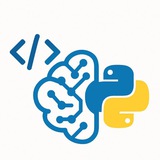The Big Book of Large Language Models by Damien Benveniste
✅ Chapters:
1⃣ Introduction
🔢 Language Models Before Transformers
🔢 Attention Is All You Need: The Original Transformer Architecture
🔢 A More Modern Approach To The Transformer Architecture
🔢 Multi-modal Large Language Models
🔢 Transformers Beyond Language Models
🔢 Non-Transformer Language Models
🔢 How LLMs Generate Text
🔢 From Words To Tokens
1⃣ 0⃣ Training LLMs to Follow Instructions
1⃣ 1⃣ Scaling Model Training
1⃣ 🔢 Fine-Tuning LLMs
1⃣ 🔢 Deploying LLMs
Read it: https://book.theaiedge.io/
Read it: https://book.theaiedge.io/
#ArtificialIntelligence #AI #MachineLearning #LargeLanguageModels #LLMs #DeepLearning #NLP #NaturalLanguageProcessing #AIResearch #TechBooks #AIApplications #DataScience #FutureOfAI #AIEducation #LearnAI #TechInnovation #AIethics #GPT #BERT #T5 #AIBook #AIEnthusiast
https://t.me/CodeProgrammer
Please open Telegram to view this post
VIEW IN TELEGRAM
👍17❤4👎1
👨🏻💻 If you want to become a data science professional, follow this path! I've prepared a complete roadmap with the best free resources where you can learn the essential skills in this field.
#ArtificialIntelligence #AI #MachineLearning #LargeLanguageModels #LLMs #DeepLearning #NLP #NaturalLanguageProcessing #AIResearch #TechBooks #AIApplications #DataScience #FutureOfAI #AIEducation #LearnAI #TechInnovation #AIethics #GPT #BERT #T5 #AIBook #AIEnthusiast
https://t.me/CodeProgrammer
Please open Telegram to view this post
VIEW IN TELEGRAM
👍35❤18👏1
Anyone trying to deeply understand Large Language Models.
Checkout
by Tong Xiao & Jingbo Zhu. It’s one of the clearest, most comprehensive resource.
⭐️ Paper Link: arxiv.org/pdf/2501.09223
Checkout
Foundations of Large Language Models
by Tong Xiao & Jingbo Zhu. It’s one of the clearest, most comprehensive resource.
#LLMs #LargeLanguageModels #AIResearch #DeepLearning #MachineLearning #AIResources #NLP #AITheory #FoundationModels #AIUnderstanding
✉️ Our Telegram channels: https://t.me/addlist/0f6vfFbEMdAwODBk📱 Our WhatsApp channel: https://whatsapp.com/channel/0029VaC7Weq29753hpcggW2A
Please open Telegram to view this post
VIEW IN TELEGRAM
❤14
🐍📰 This tutorial will give you an overview of LangGraph fundamentals through hands-on examples, and the tools needed to build your own LLM workflows and agents in LangGraph
Link: https://realpython.com/langgraph-python/
Link: https://realpython.com/langgraph-python/
#LangGraph #Python #LLMWorkflows #AIAgents #RealPython #PythonTutorials #LargeLanguageModels #AIAgents #WorkflowAutomation #PythonForA
✉️ Our Telegram channels: https://t.me/addlist/0f6vfFbEMdAwODBk📱 Our WhatsApp channel: https://whatsapp.com/channel/0029VaC7Weq29753hpcggW2A
Please open Telegram to view this post
VIEW IN TELEGRAM
❤1
LLM Interview Questions.pdf
71.2 KB
Top 50 LLM Interview Questions!
#LLM #AIInterviews #MachineLearning #DeepLearning #NLP #LLMInterviewPrep #ModelArchitectures #AITheory #TechInterviews #MLBasics #InterviewQuestions #LargeLanguageModels
✉️ Our Telegram channels: https://t.me/addlist/0f6vfFbEMdAwODBk📱 Our WhatsApp channel: https://whatsapp.com/channel/0029VaC7Weq29753hpcggW2A
Please open Telegram to view this post
VIEW IN TELEGRAM
❤7🔥3👍2
🤖🧠 Build a Large Language Model From Scratch: A Step-by-Step Guide to Understanding and Creating LLMs
🗓️ 08 Oct 2025
📚 AI News & Trends
In recent years, Large Language Models (LLMs) have revolutionized the world of Artificial Intelligence (AI). From ChatGPT and Claude to Llama and Mistral, these models power the conversational systems, copilots, and generative tools that dominate today’s AI landscape. However, for most developers and learners, the inner workings of these systems remain a mystery until now. ...
#LargeLanguageModels #LLM #ArtificialIntelligence #DeepLearning #MachineLearning #AIGuides
🗓️ 08 Oct 2025
📚 AI News & Trends
In recent years, Large Language Models (LLMs) have revolutionized the world of Artificial Intelligence (AI). From ChatGPT and Claude to Llama and Mistral, these models power the conversational systems, copilots, and generative tools that dominate today’s AI landscape. However, for most developers and learners, the inner workings of these systems remain a mystery until now. ...
#LargeLanguageModels #LLM #ArtificialIntelligence #DeepLearning #MachineLearning #AIGuides
❤3
🤖🧠 NanoChat: The Best ChatGPT That $100 Can Buy
🗓️ 20 Oct 2025
📚 AI News & Trends
In a world dominated by billion-dollar AI models like GPT-4 and Claude 3, it’s refreshing to see a minimalist, open-source alternative that puts the power of Large Language Models (LLMs) back into the hands of hackers, researchers and enthusiasts. Enter NanoChat – an end-to-end, full-stack implementation of a ChatGPT-style AI chatbot developed by Andrej Karpathy, ...
#NanoChat #ChatGPT #AI #LargeLanguageModels #OpenSource #AndrejKarpathy
🗓️ 20 Oct 2025
📚 AI News & Trends
In a world dominated by billion-dollar AI models like GPT-4 and Claude 3, it’s refreshing to see a minimalist, open-source alternative that puts the power of Large Language Models (LLMs) back into the hands of hackers, researchers and enthusiasts. Enter NanoChat – an end-to-end, full-stack implementation of a ChatGPT-style AI chatbot developed by Andrej Karpathy, ...
#NanoChat #ChatGPT #AI #LargeLanguageModels #OpenSource #AndrejKarpathy
❤2
🤖🧠 Mastering Large Language Models: Top #1 Complete Guide to Maxime Labonne’s LLM Course
🗓️ 22 Oct 2025
📚 AI News & Trends
In the rapidly evolving landscape of artificial intelligence, large language models (LLMs) have become the foundation of modern AI innovation powering tools like ChatGPT, Claude, Gemini and countless enterprise AI applications. However, building, fine-tuning and deploying these models require deep technical understanding and hands-on expertise. To bridge this knowledge gap, Maxime Labonne, a leading AI ...
#LLM #ArtificialIntelligence #MachineLearning #DeepLearning #AIEngineering #LargeLanguageModels
🗓️ 22 Oct 2025
📚 AI News & Trends
In the rapidly evolving landscape of artificial intelligence, large language models (LLMs) have become the foundation of modern AI innovation powering tools like ChatGPT, Claude, Gemini and countless enterprise AI applications. However, building, fine-tuning and deploying these models require deep technical understanding and hands-on expertise. To bridge this knowledge gap, Maxime Labonne, a leading AI ...
#LLM #ArtificialIntelligence #MachineLearning #DeepLearning #AIEngineering #LargeLanguageModels
❤3🎉1
